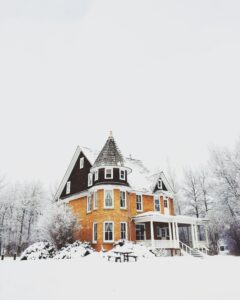Winter weather can wreak havoc on your home plumbing if you’re not prepared. If temperatures plummet and your pipes freeze, it’s important to take the right steps to thaw them out safely. Knowing what to do if your house pipes freeze can help you avoid costly repairs and damage to your property. This article will outline simple steps you can take to safely thaw frozen pipes and prevent them from freezing in the future.
What are Freezing Pipes?
Freezing pipes can be a major problem for homeowners, especially during the winter months. When water inside your pipes freezes, it expands and puts pressure on the walls of the pipe. This can cause the pipe to crack or burst, leading to costly water damage in your home. Pipes that are most at risk for freezing include those located in unheated areas such as garages, attics, and crawl spaces.
If you suspect that your house pipes have frozen, it’s important to act quickly before they burst. First, turn off the main water supply to prevent further damage. Then open all faucets in your home to relieve pressure and allow any remaining water to escape. If you know where the frozen area is located, use a hair dryer or space heater to slowly thaw out the affected section of pipe.
Preventing frozen pipes is key in avoiding this messy and expensive problem altogether. Some preventative measures include insulating exposed pipes with foam insulation wrap or heat tape and keeping your thermostat at a consistent temperature both day and night. By taking these steps, you can protect your home from freezing pipes and avoid costly repairs down the line.
Causes of Frozen Pipes
Frozen pipes can be a huge headache for homeowners, as they can cause significant damage to your home if not addressed immediately. But what causes them to freeze in the first place? One of the most common reasons is when the temperature outside drops below freezing and the water inside the pipes freezes as well. This can happen when homes are left unoccupied for extended periods, or heating systems malfunction.
Another cause of frozen pipes is poor insulation. If your home’s walls and plumbing aren’t properly insulated, it leaves your pipes vulnerable to freezing temperatures. This is especially true for older homes that may not have been built with modern insulation materials or techniques.
Finally, blocked or clogged drains can also lead to frozen pipes. When drains become clogged with debris, it restricts water flow through the pipe and allows ice to form more easily. Regular maintenance such as cleaning out drains on a regular basis can help prevent this from happening and keep your plumbing functioning properly during colder months.
Warning Signs & Symptoms
If you’re worried about frozen pipes, there are a few warning signs and symptoms to look out for. First and foremost, if you turn on the tap and no water comes out or just a small trickle, it’s likely that your pipes are frozen. You may also notice strange smells coming from your drains or hear banging or clanging sounds when you turn on the faucet. These noises can be caused by air pockets in the pipes due to ice blockages.
Other warning signs of frozen pipes include frost on exposed pipes or bulging sections of pipe that feel hard to the touch. If you notice any of these symptoms, it’s essential to take action immediately before your pipes burst and cause major damage to your home. Start by turning off your main water supply and then call a plumber who has experience dealing with frozen pipes.
In conclusion, recognizing the warning signs of frozen pipes is crucial in preventing costly damage to your home. Keep an eye out for low water pressure, strange noises, frosty pipes or bulges in pipe sections as these are all indicators that something isn’t right with your plumbing system. If you suspect that your house pipes have already frozen over, take immediate action by shutting off the main water valve and consulting a professional plumber for assistance.
Preventative Measures
Preventative measures can save you from the headache of dealing with frozen pipes in your home. Firstly, it’s important to keep your home heated even when you’re away for an extended period of time. This way, the temperature won’t drop too low and cause the pipes to freeze. You may also consider insulating your pipes or installing pipe sleeves to reduce heat loss and protect against freezing.
Another preventive measure is to seal any gaps or cracks around your home that may allow cold air inside. This could include sealing windows or doors, caulking exterior walls, and checking for holes in insulation. It’s also essential to disconnect garden hoses during winter months as water left inside can cause outdoor faucets and connected pipes to freeze.
In case the worst happens, turn off your main water supply immediately if a pipe freezes and call a professional plumber who specializes in thawing frozen pipes safely. Don’t try to thaw the pipes yourself using open flames or electric heating appliances as this can be dangerous and risk causing further damage. Remember that being proactive is always better than reactive when it comes to preventing damage caused by frozen pipes!
Thawing a Frozen Pipe
If you find yourself with frozen pipes in your home, it’s important to act quickly to prevent further damage. One of the first steps you can take is to locate the frozen area. This can typically be found where water supply lines are exposed, such as near exterior walls or in unheated areas like basements and crawl spaces.
Once you’ve identified the location of the frozen pipe, it’s time to begin thawing it out. One effective method is to use a hair dryer or space heater aimed at the affected area. Be sure not to use any open flames or high heat sources that could cause damage or create a fire hazard. Alternatively, wrapping the pipe with towels soaked in hot water can also help thaw out the ice blockage.
As you work on thawing out your pipes, keep an eye out for signs of leaks or damage caused by freezing temperatures. If you notice any issues, it’s best to call a licensed plumber who can assess and repair any problems before they become worse and potentially cause costly repairs down the line.
Calling a Professional Plumber
A professional plumber is essential when dealing with frozen pipes in your home. If you suspect that your pipes have frozen, it’s important to call a licensed plumber as soon as possible. A trained plumber can help determine the extent of the damage and provide expert advice on how to proceed.
When calling a professional plumber regarding frozen pipes, be sure to ask about their experience and qualifications. Look for a licensed plumber with a solid reputation who has experience dealing with similar issues in the past. They should also be able to provide you with an estimate of the cost and time required for repairs.
Remember that attempting to thaw or repair frozen pipes on your own can lead to further damage, so always seek out a qualified professional when dealing with this type of issue. With timely intervention from an experienced plumber, you can minimize the damage caused by frozen pipes and get back to enjoying your home without any further interruption or stress.
Conclusion
In conclusion, preventing frozen pipes is crucial for keeping your home safe and comfortable during the winter season. Taking preventive measures such as insulating your pipes or allowing faucets to drip can go a long way in avoiding the inconvenience and cost of frozen pipes. Additionally, if you do experience frozen pipes, it’s important to act quickly and safely to prevent further damage.
If you suspect that your pipes have frozen or burst, turn off the main water supply immediately and contact a professional plumber. Attempting to thaw or fix the issue yourself can lead to more significant problems down the line. Remember that prevention is key when it comes to reducing the likelihood of pipe freezing issues, so don’t hesitate to take steps ahead of time before temperatures drop too low. By being proactive about maintaining your plumbing system, you can avoid costly repairs and keep your home running smoothly throughout even the coldest months of the year.


